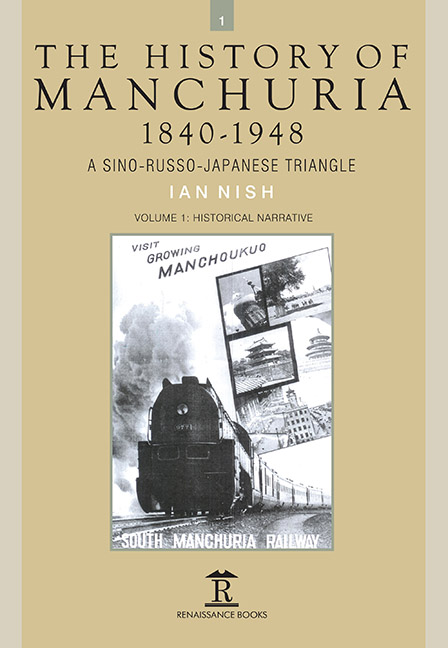Book contents
- Frontmatter
- Dedication
- Contents
- Preface
- Acknowledgements
- Name Conventions
- List of Abbreviations
- List of Maps
- Chapter One Manchuria and Russian Ambition, 1840s–1890s
- Chapter Two Sino-Japanese War and After, 1894–1900
- Chapter Three Prelude to the Russo-Japanese War, 1900–1905
- Chapter Four Railways, Reforms and Revolutions, 1906–1914
- Chapter Five Wartime Turmoil in Manchuria, 1915–1922
- Chapter Six Chang Tso-Lin’s Manchuria, 1922–28
- Chapter Seven Chinese Nationalism and Foreign Railways, 1929–1931
- Chapter Eight Lytton Commission in Manchuria, 1931–1932
- Chapter Nine Manchukuo: From Republic to Empire, 1933–1937
- Chapter Ten A Decade of Wars, 1938–1948
- Epilogue
- Map
- Select Bibliography
- Index
- Volume 2: Select Primary Sources
- Miscellaneous Frontmatter
- Dedication
- Miscellaneous Frontmatter
- Chapter 1 1840–1894
- Chapter 2 1895–1899
- Chapter 3 1900–1905
- Chapter 4 1905–1914
- Chapter 5 1915–1922
- Chapter 6 1922–1928
- Chapter 7 1929–1931
- Chapter 8 1931–1932
- Chapter 9 1933–1937
- Chapter 10 1938–1948
- Apendix Appeal by the Chinese Government
Chapter 6 - 1922–1928
Published online by Cambridge University Press: 18 November 2023
- Frontmatter
- Dedication
- Contents
- Preface
- Acknowledgements
- Name Conventions
- List of Abbreviations
- List of Maps
- Chapter One Manchuria and Russian Ambition, 1840s–1890s
- Chapter Two Sino-Japanese War and After, 1894–1900
- Chapter Three Prelude to the Russo-Japanese War, 1900–1905
- Chapter Four Railways, Reforms and Revolutions, 1906–1914
- Chapter Five Wartime Turmoil in Manchuria, 1915–1922
- Chapter Six Chang Tso-Lin’s Manchuria, 1922–28
- Chapter Seven Chinese Nationalism and Foreign Railways, 1929–1931
- Chapter Eight Lytton Commission in Manchuria, 1931–1932
- Chapter Nine Manchukuo: From Republic to Empire, 1933–1937
- Chapter Ten A Decade of Wars, 1938–1948
- Epilogue
- Map
- Select Bibliography
- Index
- Volume 2: Select Primary Sources
- Miscellaneous Frontmatter
- Dedication
- Miscellaneous Frontmatter
- Chapter 1 1840–1894
- Chapter 2 1895–1899
- Chapter 3 1900–1905
- Chapter 4 1905–1914
- Chapter 5 1915–1922
- Chapter 6 1922–1928
- Chapter 7 1929–1931
- Chapter 8 1931–1932
- Chapter 9 1933–1937
- Chapter 10 1938–1948
- Apendix Appeal by the Chinese Government
Summary
[AUTHOR’S NOTE: THE Sino-Soviet Agreements, etc. of May 31, 1924 were not recognized by Marshal Chang Tso-lin, High Inspecting Commissioner of (independent) Manchuria, and the provisions relating to the Three Eastern Provinces could not, therefore, be fulfilled by the Central Government. In the latter part of September, when China was in the throes of civil war, and Marshal Chang Tso-lin was denounced as a “rebel” by the Central Government, a separate agreement was signed at Mukden between a Soviet emissary and representatives of Marshal Chang Tso-lin. The signatories of this agreement were: N. K. Kuznetzoff on behalf of Soviet Russia (Vice-Chairman of the Provincial Assembly) and Chung Shih-min (Commissioner for Foreign Affairs). The agreement as published by the Rosta News Agency was as follows.]
Agreement Entered into Between the Autonomous Government of the Three Eastern Provinces of the Republic of China and the Government of the Union of Soviet Socialist Republics.
(Signed in Mukden on September 20, 1924)
The Autonomous Government of the Three Eastern Provinces of the Republic of China and the Government of the Union of Soviet Socialist Republics, desiring to promote friendly relations and to adjust the various problems concerning mutual rights and privileges, have agreed to conclude an agreement, and have to that end named as their Plenipotentiaries, that is to say:
The Autonomous Government of the Three Eastern Provinces of the Republic of China: Cheng Chien, Lü Jung Huan and Chung Shih Ming:
The Government of the Union of Soviet Socialist Republics:—— N. K. Kuznetzoff;
Who, having communicated to one another their respective full powers found to be in good and due form, have agreed upon the following Articles:
Article I.—The Chinese Eastern Railway.
The Governments of the two Contracting Parties agree to settle the question of the Chinese Eastern Railway as follows:
The Governments of the two contracting Parties declare that the Chinese Eastern Railway is a purely commercial enterprise.
- Type
- Chapter
- Information
- The History of Manchuria, 1840-1948A Sino-Russo-Japanese Triangle, pp. 85 - 96Publisher: Amsterdam University PressPrint publication year: 2016

